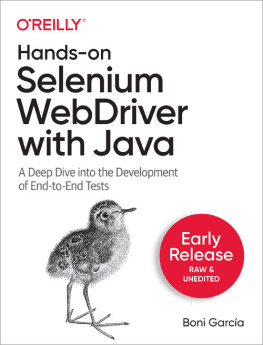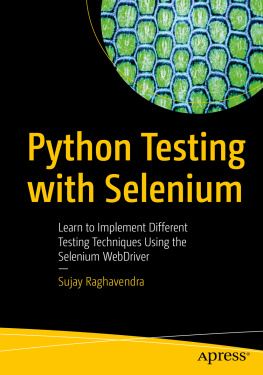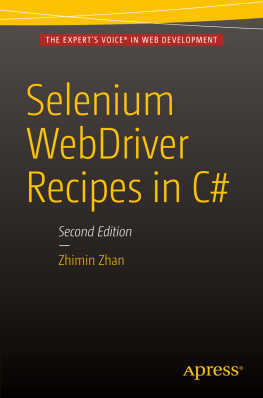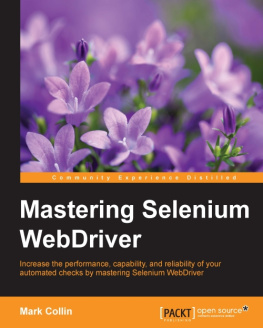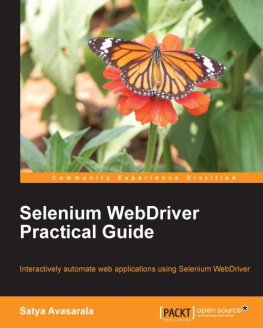Boni García - Hands-on Selenium WebDriver with Java
Here you can read online Boni García - Hands-on Selenium WebDriver with Java full text of the book (entire story) in english for free. Download pdf and epub, get meaning, cover and reviews about this ebook. year: 2022, publisher: OReilly Media, Inc., genre: Computer. Description of the work, (preface) as well as reviews are available. Best literature library LitArk.com created for fans of good reading and offers a wide selection of genres:
Romance novel
Science fiction
Adventure
Detective
Science
History
Home and family
Prose
Art
Politics
Computer
Non-fiction
Religion
Business
Children
Humor
Choose a favorite category and find really read worthwhile books. Enjoy immersion in the world of imagination, feel the emotions of the characters or learn something new for yourself, make an fascinating discovery.
- Book:Hands-on Selenium WebDriver with Java
- Author:
- Publisher:OReilly Media, Inc.
- Genre:
- Year:2022
- Rating:5 / 5
- Favourites:Add to favourites
- Your mark:
- 100
- 1
- 2
- 3
- 4
- 5
Hands-on Selenium WebDriver with Java: summary, description and annotation
We offer to read an annotation, description, summary or preface (depends on what the author of the book "Hands-on Selenium WebDriver with Java" wrote himself). If you haven't found the necessary information about the book — write in the comments, we will try to find it.
Boni García: author's other books
Who wrote Hands-on Selenium WebDriver with Java? Find out the surname, the name of the author of the book and a list of all author's works by series.
Hands-on Selenium WebDriver with Java — read online for free the complete book (whole text) full work
Below is the text of the book, divided by pages. System saving the place of the last page read, allows you to conveniently read the book "Hands-on Selenium WebDriver with Java" online for free, without having to search again every time where you left off. Put a bookmark, and you can go to the page where you finished reading at any time.
Font size:
Interval:
Bookmark:

by Boni Garca
Copyright 2021 YEAR OReilly Media. All rights reserved.
Printed in the United States of America.
Published by OReilly Media, Inc. , 1005 Gravenstein Highway North, Sebastopol, CA 95472.
OReilly books may be purchased for educational, business, or sales promotional use. Online editions are also available for most titles (http://oreilly.com). For more information, contact our corporate/institutional sales department: 800-998-9938 or corporate@oreilly.com .
- Acquisitions Editor: Suzanne McQuade
- Development Editor: Virginia Wilson
- Production Editor: Caitlin Ghegan
- Copyeditor: TK
- Proofreader: TK
- Indexer: TK
- Interior Designer: David Futato
- Cover Designer: Karen Montgomery
- Illustrator: Kate Dullea
- September 2022: First Edition
- 2021-08-20: First Release
See http://oreilly.com/catalog/errata.csp?isbn=9781098110000 for release details.
The OReilly logo is a registered trademark of OReilly Media, Inc. Hands-on Selenium WebDriver with Java, the cover image, and related trade dress are trademarks of OReilly Media, Inc.
The views expressed in this work are those of the author, and do not represent the publishers views. While the publisher and the author have used good faith efforts to ensure that the information and instructions contained in this work are accurate, the publisher and the author disclaim all responsibility for errors or omissions, including without limitation responsibility for damages resulting from the use of or reliance on this work. Use of the information and instructions contained in this work is at your own risk. If any code samples or other technology this work contains or describes is subject to open source licenses or the intellectual property rights of others, it is your responsibility to ensure that your use thereof complies with such licenses and/or rights.
978-1-098-11000-0
[ ]
With Early Release ebooks, you get books in their earliest formthe authors raw and unedited content as they writeso you can take advantage of these technologies long before the official release of these titles.
This will be the preface of the final book. Please note that the GitHub repo will be made active later on.
If you have comments about how we might improve the content and/or examples in this book, or if you notice missing material within this chapter, please reach out to the development editor at .
Selenium is an open-source automation framework that allows driving web browsers as a user would. In the heart of Selenium, we find WebDriver, which is a library for controlling browsers (e.g., Chrome, Firefox, Edge, Safari, or Opera) programmatically. Selenium WebDriver provides a cross-browser Application Programming Interface (API) in several programming languages (officially supported in Java, JavaScript, Python, C#, or Ruby).
Although we can use Selenium WebDriver for multiple purposes related to browser automation, its principal usage is implementing end-to-end tests (i.e., web applications verification). Nowadays, thousands of organizations and testers use Selenium worldwide, and it is one of the most relevant frameworks for end-to-end testing, supporting a multi-million dollar industry.
This book provides a comprehensive summary of the main features of Selenium WebDriver version 4 using Java as language binding. It reviews the main aspects of automated web navigation, browser manipulation, web element interaction, user impersonation, automated driver management, the design pattern Page Object Model (POM), remote and cloud infrastructure, integration with Docker, advanced capabilities, and much more.
The primary audience of this book includes Java coders: developers, testers, QA engineers, etc. Thus, you need a basic knowledge of the Java language and object-oriented programming. The final goal is to have a comprehensive understanding of the main aspects of Selenium WebDriver to create end-to-end tests using different testing frameworks in Java.
Test automation is a software testing technique that leverages automation tools to control test execution. It allows increasing the efficiencies and effectiveness while ensuring the overall quality of a software system. In this arena, Selenium is the de-facto standard framework to develop end-to-end tests for web applications. This book provides a complete review of Selenium 4, released in 2021.
This book follows a learn-by-doing approach. To that aim, we review the main features of Selenium WebDriver through ready-to-be-executed test examples. These examples are publicly available in a GitHub open-source repository (https://github.com/bonigarcia/selenium-webdriver-java). For the sake of diversity, this repository contains each test example in different flavors regarding the embedding testing framework: JUnit 4, JUnit 5 (alone or with Selenium-Jupiter), and TestNG.
I divided the content of this book into three parts and ten chapters, namely:
provides a technological background on Selenium, test automation, and project setup. This part, more theoretical than practical, is composed of two chapters:
, A Primer on Selenium, presents the core projects of the Selenium framework (WebDriver, Grid, and IDE) and its ecosystem (i.e., the tools and technologies around Selenium). In addition, this chapter reviews the principles of end-to-end testing related to Selenium.
, Preparing for Testing, explains how to set up a Java project (Maven and Gradle) containing end-to-end tests that use the Selenium WebDriver API. Then, you will learn how to develop your first WebDriver tests using different testing frameworks: JUnit 4, JUnit 5 (alone or in conjunction with Selenium-Jupiter), and TestNG.
Part II provides a practical insight into the Selenium WebDriver API. This part is guided by tests available in the examples repository and comprises the following chapters:
Chapter 3, WebDriver Fundamentals, describes the primary aspects of the Selenium WebDriver API to carry out automated interaction with web applications. Thus, this chapter reviews several strategies for locating and waiting for web elements. In addition, you will discover how to impersonate user actions (i.e., automated interactions using the keyboard and mouse) in a browser.
Chapter 4, Browser-Agnostic Features, reviews those aspects of the WebDriver API that are interoperable in different browsers. Thus, this chapter shows how to execute JavaScript, create event listeners, manage windows, make screenshots, manipulate cookies, access the browser history, or interact with windows, tabs, and iframes, among other features.
Chapter 5, Browser-Specific Manipulation, explains those aspects of the WebDriver API particular to specific browsers.This group of features covers the browser capabilities (options, arguments, and preferences), HTTP proxies, the Chrome DevTools Protocol (CDP), network interceptor functions, the WebDriver BIDI API, log gathering, basic authentication, and the Input Method Engine (IME) API.
Font size:
Interval:
Bookmark:
Similar books «Hands-on Selenium WebDriver with Java»
Look at similar books to Hands-on Selenium WebDriver with Java. We have selected literature similar in name and meaning in the hope of providing readers with more options to find new, interesting, not yet read works.
Discussion, reviews of the book Hands-on Selenium WebDriver with Java and just readers' own opinions. Leave your comments, write what you think about the work, its meaning or the main characters. Specify what exactly you liked and what you didn't like, and why you think so.

